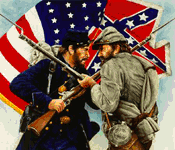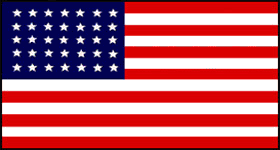 |
Civil War Battles |
|
State War Records |
| AL - AK - AZ - AR - CA - CO - CT - DE - FL - GA - HI - ID - IL - IN - IA - KS - KY - LA - MA - MD - ME - MI - MN - MS - MO - MT - NE - NV - NH - NJ - NM - NY - NC - ND - OH - OK - OR - PA - RI - SC - SD - TN - TX - UT - VT - VA - WA - WV - WI - WY |
The Battle of Moorefield
August 7, 1864 in Moorefield, West Virginia
 |
|||||||||||||||||||
|
Brig. Gens. John McCausland's and Johnson's brigades had arrived in the Moorefield area on August 6. Ignoring advice given by Capt. John Hanson McNeill, a local Confederate partisan, McCausland encamped his force in exposed positions on the south bank of the South Branch of the Potomac River, 3 miles north of Moorefield. Johnson's brigade camped on the north bank, a mile or so from McCausland's force, and 4 miles north of Moorefield.
Early on the morning of the 7th, it was learned that a large force of Union cavalry commanded by Averell was on the way to Moorefield. Upon hearing the news, McCausland hurriedly scribbled out orders to Col. James Cochran, whom he had left in charge of his troops, and Johnson. He then went back to sleep. Rising around dawn, McCausland mounted his horse and left Moorefield. Heading back to camp, he encountered fleeing troops from his command. Attempting to rally them, McCausland soon realized that his command had disintegrated under Averell's attack.
Johnson received McCausland's order at 2:00 A.M., "a verbal order by courier from McCausland, informing me that Averell had passed through Romney the preceding evening with 3 brigades of cavalry, and directing me to saddle up my command, and send out a scout on the Romney Road." Johnson obeyed the order. However, unknown to McCausland, Averell's 3 brigades had spent the evening of the 6th resting, about 10 miles from Moorefield. By 1:00 A.M. on the 7th, Averell's force was mounted and moving toward Moorefield again. About 3 hours later, they encountered Johnson's troops.
Averell's advance were disguised in Confederate uniforms and captured the 1st Maryland's pickets, who were asleep at their posts. They rode through the 1st Maryland's camp, shouting, "Surrender, you house-burning scoundrels!" and "Kill every damned one of them!" A large body of Union cavalry followed right behind, dispersing the camps of the 1st and 2nd Maryland. Gibson's troops pursued fleeing Confederates to the Potomac, forcing them over the steep banks, and into the water. Thereupon, Averell ordered a brigade commanded by Col. William Powell to cross the river and attack McCausland's brigade, which was making a stand on the south bank.
Crossing the river under heavy fire, Powell's troops routed McCausland's brigade, and sent them fleeing toward Moorefield, where McCausland met them on his way back to camp. He managed to rally a portion of his brigade, and made a stand about a mile from the river, but was routed again by Powell's troops. Confederates scattered in every direction, and Averell's troops pursued them for several hours. About 200 Confederates fled into Moorefield, where Johnson later arrived. He rallied them, to withstand an anticipated Federal assault.
Meanwhile, those troops of the 1st and 2nd Maryland remaining on the north bank tried to stop Averell's onslaught, to no avail. Averell's brigades were armed with repeating rifles, while the Confederates were equipped with muzzle-loading, single shot rifles. Averell's better-armed troops quickly located and surrounded Willow Wall and captured Johnson, three staff officers, and 500 troops of the 1st and 2nd Maryland. But Johnson mingled among the other prisoners, and escaped to Moorefield. When no Union assault occurred there, Johnson's small force retreated to Gen. Early's headquarters at Mount Jackson in Virginia. Most of Johnson's brigade was sent to Camp Chase, Ohio, where its members spent the remainder of the war.
McCausland blamed Johnson for the Moorefield defeat. Johnson requested an investigation, but none was ever conducted. Early concluded that Johnson was responsible for the disaster, basing his judgment on the fact that Maryland had not seceded (from the Union) and that Johnson was from Maryland. Gen. Lee, relying on Early's conclusion, relieved Johnson of command of the 1st and 2nd Maryland. Johnson finished the war as commandant of Salisbury Prison in Salisbury, N.C. Weakened by the loss of their cavalry, the Army of the Valley was destroyed on October 19 at the Battle of Cedar Creek.
The defeat at Moorefield was caused by low morale and poor discipline among Confederate troops, and crucial mistakes by McCausland. As Johnson stated, "Had there been less plunder, there would have been more fighting at Moorefield " The disaster came at a critical time for the South, when the Army of Northern Virginia was struggling at Petersburg against the Army of the Potomac, and when Federal troops were closing in on Atlanta in the Western theater. The destruction of Early's weakened army at Cedar Creek in turn put more pressure on the Army of Northern Virginia, and ultimately resulted in Gen. Lee's surrender at Appomattox.
